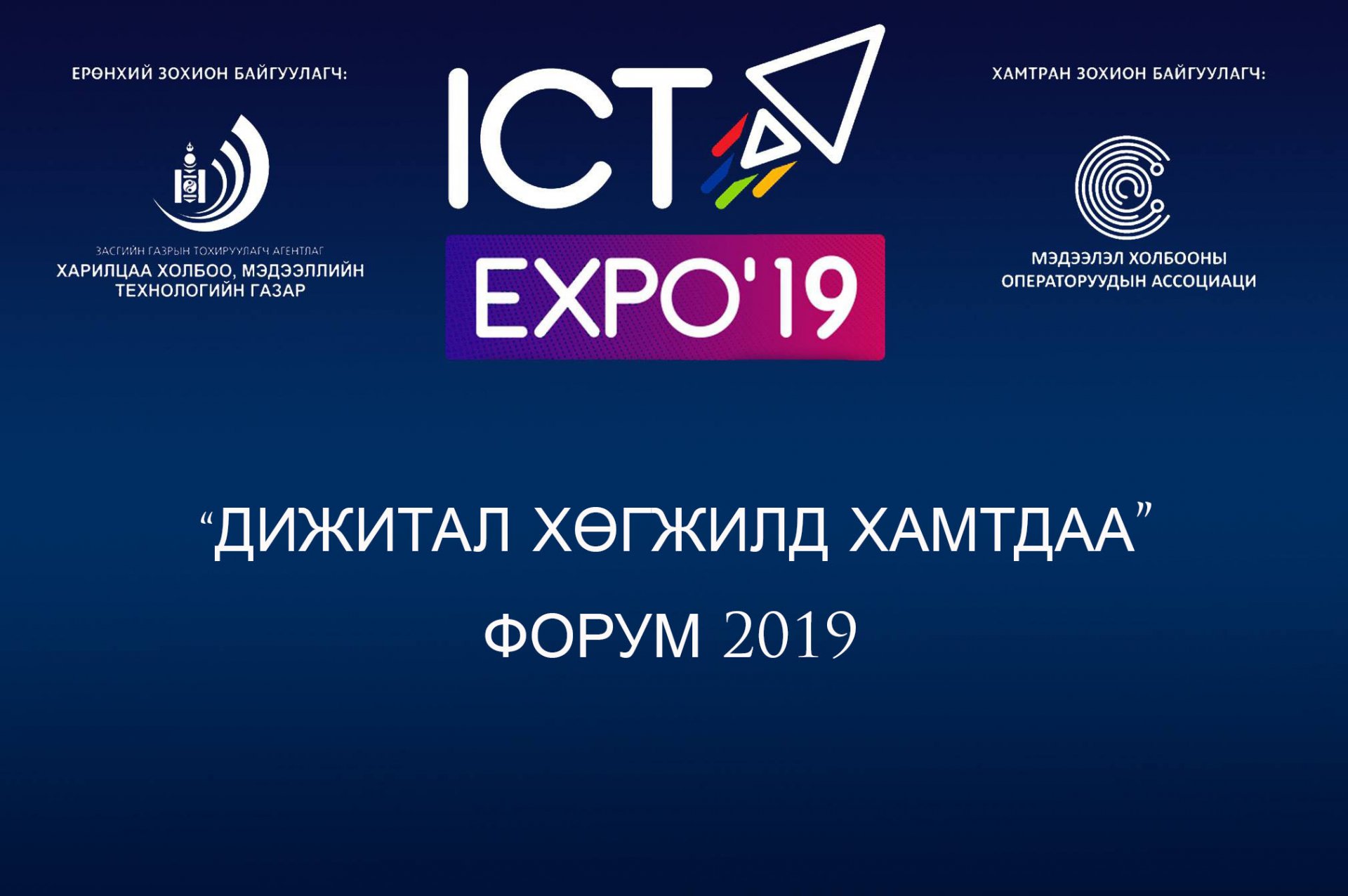In the framework of “ICT-Expo” exhibition since last year forum under the slogan on “Together for digital transformation” has been organized, which policy makers, governmental agencies and private sector organizations and specialist of the sector have discussed about how to utilize effectively, how to cooperate and how to find correct and optimal existence and solution to deliver development and achievement of communication and information technology to the public and accelerate development of other social and economic sectors.
The forum on “Together for digital transformation” of this year was organized jointly by Communication and information technology Authority and Information and Communication Operators’ Association In “Soyombo” hall of “Tuushin” hotel on 24 September.
The forum was conducted when the state Great Khural adopted amendments of the law on Communication last May and legal reform was made as for the sector, introduced about new coordination of the law and it was specific in it.
The first part-Panel discussion on ”Connecting intersectorial activities
The discussion consists of two panels and in the first panel Vice Rector of NUM Ch. Participated as a moderator, Head of Temporary Committee of E-policy of the state Great Khural, Parliament member N.Uchral, Chairman of Communication and information technology authority B. Chinbat, Head of department of National development authority D. Erdenebayar, Head of strategic planning department of information and Netcom State-owned Company Ts. Odkhuu as panelists Permanent representative of Food and agriculture organization of the United Nations In Mongolia Vinod Ahuja, State secretary of Ministry of Food, Agriculture and light industry T. Jalbaltseren, Head of department of the National Development Authority D. Erdenebayar, Director of department of Unitel group B. Enkhtuvshin, Director of Odo ecosystem LLC Ch. Mashaa as panelists and discussed issues how to digitalize information required to develop policy of the national development and policy on digital transformation of Mongolia and conduct policy survey and-strategy of agriculture.
Nowadays each country of the world considers that communication and information technology development and achievement will bring efficiency and sustainable development to all the social and economic sectors and puts objectives to implement digital transformation. In this standard Mongolia has defined digital transformation policies, established temporary committee on E-policy by the State great Khural, at the Government level national programme on E-governance was adopted and has started to implement short term objective to digitalize governmental service for the first time.
Panelist Ts. Odkhuu introduce “Today at the national level of Mongolia communication companies established fibre optic network of over 40 thousand km, connected 310 soums, installed 3G, 4G stations of mobile communication in all the soums and settled areas, have delivered their service to 280 thousand households, over 2400 organizations and 4.3 million customers in the duplicated number and opportunity to accept desired e-service from all soums and settled areas of Mongolia suing fibre optic network, 3G and 4G technology of mobile communication, has been created.
Project manager S.Tengis informed that conclusion was made in the survey that preparedness of Mongolia on infrastructure and technology has been provided completely to make evaluation on technological preparedness of Mongolia in the framework of the project on “Mongolia in the Digital Age” implementing by the Secretariat of the Government and Communication and Information Technology Authority, Technological development commission of Oxford University of England and Access Solution LLC.
There fore participants of the forum agreed cooperation and leadership are crucial to discuss about issues on how to utilize advantages of constructed infrastructure and introduced advanced technology in all the social and economic sectors effectively and how to connect digital transformation of each sector and reach to the united understanding and solution.
Governmental policy and experience of the countries, leading in digital transformation including the Republic of Korea, Estonia Singapore, USA, Australia, Canada and European Union have shown issues to have united management to ensure interconnection of all the stakeholders, make evaluation of implementation at each policy stage and follow digital system architecture, network design and standard have put as priorities. .
By the amendments of the law on Communication, newly adopted in this standard, empower to ensure united policy and planning of issue to introduce product and service based on communication and information technology in all the social and economic sectors and ensure interconnection of all the implementing projects and programmes was issued to the Communication and Information Technology Authority.
Participants of panel discussion highlighted that this new coordination has importance in the current situation, when the government cannot digitalize service for citizens, each sector has implemented digital transformation in some extent has spent millions money and capital and it cannot be effective.
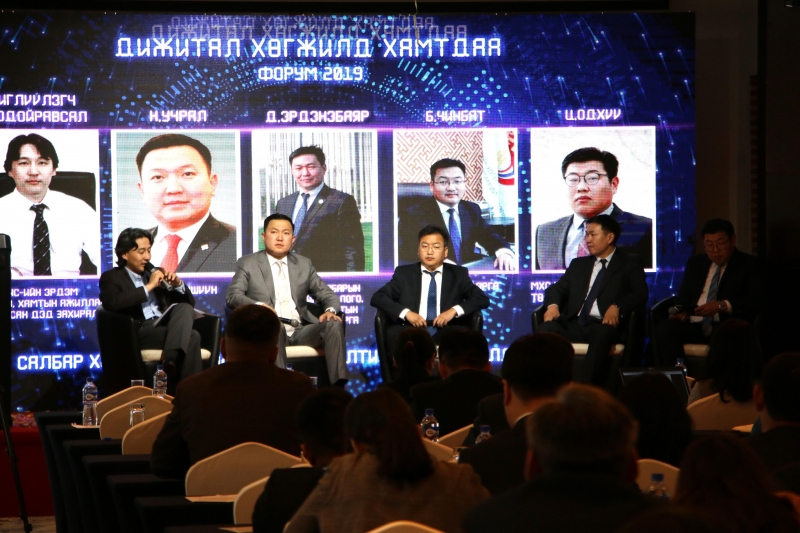
The next part of forum-Panel discussion “Digital transformation-Our leadership”
In the discussion mobile communication companies made speech and discussion on how digital transformation has implanted and which changes has brought in business sector. In the discussion Executive director of Mogul Consulting Service LLC N. Javkhlan participated as a moderator Consultant of Prime Minister J. Bat-Erdene, General director of Mobicom Corporation Tatsuya Hamada, Executive director of Unitel group D. Enkhbat, and service G. Amarchingun as panelists.
Presenter G. Amarchingun introduced in his speech “There are no any not to implement digital transformation, as result of implementation of the transformation greater change will create new opportunities in business activity, it will change business model and create efficiency growth and new business. Digital transformation starts from activity to technologize business activity, it will change business model and create efficiency growth and new business. To implement digital transformation business organizations have started to change their strategy at first. As for 2018 digital transformation became the main strategy of business for 67% of 200 global companies. New companies such as Uber, Netflix, Amazon, Paypal, and companies including American airline, Mercedes Benz, General electric, JP Morgan chase, Boeing and Walt Disney have changed their strategy as digitalization. As for sector except technology sector, newspaper, magazine, book, music, video, and sector of retail sale have already implemented digital transformation. Digital transformation has intensified in bank, finance, telecommunication, transport, agriculture, medical sector and governmental service.”
In Mongolia, particularly in communication sector business entities have attempted render support to digitalization of other sector as for communication sector and to lead digital transformation themselves.
Presenter B. Munkhzorig told “Mobicom” Corporation has made three years plan to make digital transformation and has implemented over 20 small projects. Particularly, the nature of the project on “Customer Experience” is to study all the applications from the period to become customer of Mobicom up to now and in other words has proposed in accordance with customer behavior perfectly based on big data of customers. Meanwhile, the company has implemented management leadership to digitalize domestic activities, create and form digital thinking among staff and employees. Through implementing these projects by the present time, utilization and service cost has decreased by 25%, time to spend for repair and service of engineers and technical staff 25%, program utilization cost 43% and through using cloud technology productivity has increased.
Panelist D. Enkhbat made speech “Unitel group has worked to render support to digital transformation of sectors including telecom, entertainment and media and increase access of these sectors. Also through introducing internet “service, opportunity to accept digital service for citizens of ger national dwelling district has been created. To process customer and application data it has started to use machine intelligence and cloud technology. In this way has increased number of data to produce per unit term. Also improved constitution of resource particularly has created human resource, time resource and knowledge resource.
Skytel group has chosen digital transformation as its strategy, has evaluated conditions of the company in the new international method, has determined definite purpose and objectives and has conducted survey on business modeling.
Also panelist J.Bat-Erdene highlighted that as for the government creating cooperation with the private sector presenting management leadership and making legal and policy reform are important steps to implement digital transformation at the national level.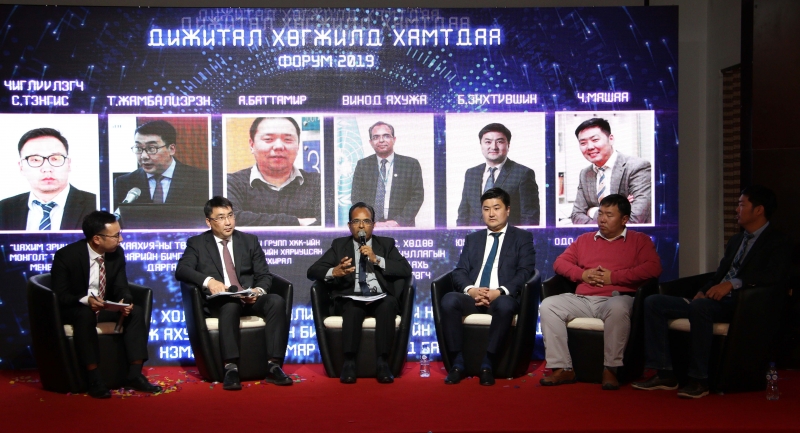
The third part of forum-Panel discussion on “Measurement of competitiveness of information and communication sector”
The discussion was made on” Measurement of competitiveness of information and communication sector and General director of Economic policy and competitiveness research center B. Lakshmi, and project manager of “Mongolia in digital age” S. Tengis made presentations. In the discussion Chief Editor of ikon.mn site Ch.Bolortuya participated as a moderator and Head of department of Communication and Information Technology Authority B.Bilegdemberel, Director of strategic planning department of Mongolia Telecom Company Ch. Purensuren, Senior specialist of Communication Regulatory Commission Kh.Ninjbolor, General director of Economic policy and competitiveness research center B. Lakshmi, and project manager of “Mongolia in digital age” S.Tengis participated as panelists.
In this panel discussion discussed thesis, which have not been discussed before, for example “Made conclusion that competiveness is at the international level, regional, national and intersectorial levels. But does the sector determine competitiveness inside? Which is competitiveness expressed, measured in? Are there any results of measurement?”
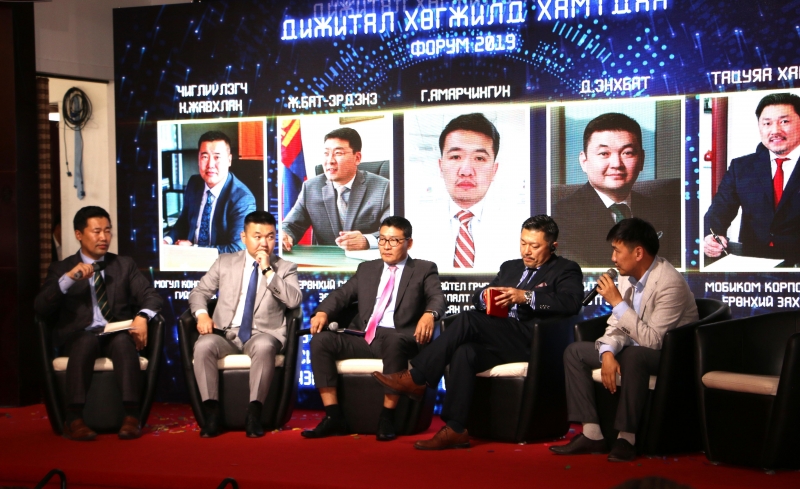
Presenter S. Tengis introduced evolution criteria of preparedness of technological development of Mongolia in the framework of the project on” Mongolia in Digital Age” and presenter B.Lakshmi introduced about how to study competitiveness, said prepared for this panel discussion, studied it as for communication and information sector, introduced with statistical survey of the Regulatory Committee, but there has not been definite information. Senior specialist of CRC Ninjbolor answered the question “Can Regulatory Commission evaluate competitiveness of companies at the sectorial level?” that “Regulatory organization supports market competition and sustainable investment in the international standard conducts regulation on creating efficiency and thus instead of regulatory organization, it is crucial that service providers conduct in the industry regulation framework themselves, if they want.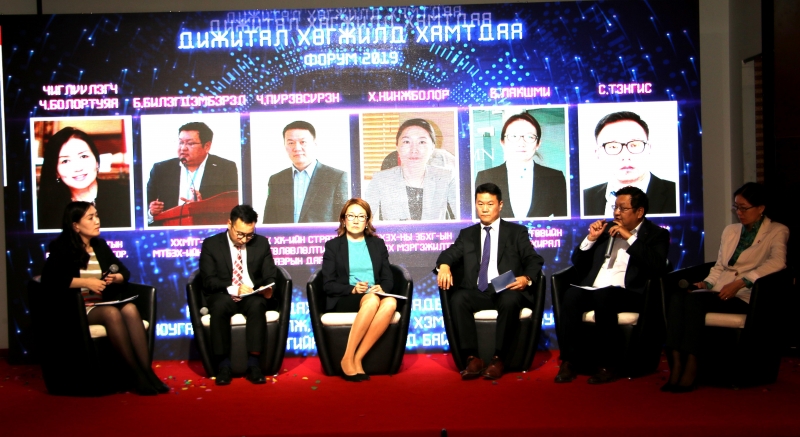
This panel discussion was discussion, which attempted to see competitiveness at the sectorial level from the different angle expressed it might become the thesis for discussion furthermore.



.jpg)

